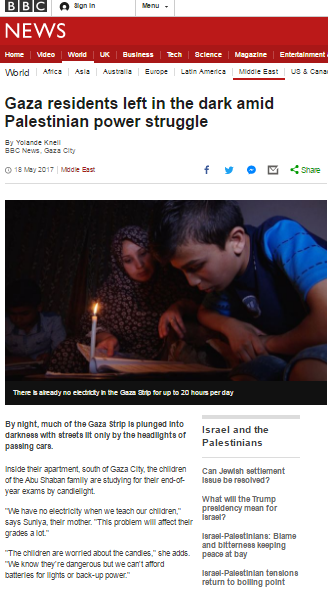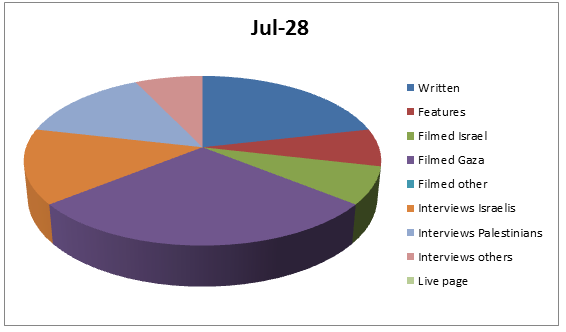On several occasions in the past we have documented the BBC’s repeated misrepresentation of the perennial electricity crisis in the Gaza Strip as being connected to Israeli counter-terrorism measures. [emphasis added]
“The manager, Rafik Maliha, has been here since the electricity plant opened a decade ago. It was supposed to make use of the latest technology to meet rising demand. Instead, it’s faced constant challenges. It’s been caught up in previous fighting between Hamas which controls Gaza and the group’s sworn enemy Israel. Tight border restrictions limited fuel imports. Although power cuts were common in Gaza before, now they’re much worse.” (August 15th 2014 – link to source)
“More than 10 years ago, Israel destroyed a large part of the power plant located in central Gaza after the kidnapping of Israeli soldier Gilad Shalit by Hamas militants.
Since then, power shortages have had an impact on almost every aspect of life in Gaza.” (January 14th 2017 – link to source)
“Gaza’s everyday problems don’t stop though with unreliable electricity; the rest of the infrastructure is shot. A lot of recent war damage lies unreconstructed. The economy is lifeless, unemployment sky-high. So whose fault is it? People here wave their arms in many directions. The Israelis first, for the stifling border closures the Israeli government says are for security, the people here say are for collective punishment.” (February 1st 2017 – link to source)
“Power cuts in Gaza typically last 8 to 12 hours a day – sometimes longer. […]
There are strict controls on the movement of goods and people going in and out of Gaza.” (April 18th 2017 – link to source)
“Gaza’s electricity supply has been also affected by restrictions on the import of goods imposed by Israel as part of a land, sea and air blockade that is now in its 10th year. (April 27th 2017 – link to source)
However, on May 18th an article by Yolande Knell that appeared in the ‘features’ section of the BBC News website’s Middle East page demonstrated that the BBC is entirely aware of the fact that the electricity crisis in the Gaza Strip is not caused by Israeli counter-terrorism measures at all, but by internal Palestinian disputes.
Readers of that report – titled “Gaza residents left in the dark amid Palestinian power struggle” – were informed that:
“Behind the crisis is an escalating political power struggle between the Islamist group, Hamas, and the Palestinian Authority (PA), dominated by the rival Fatah movement. […]
Now, Mr Abbas’s West Bank-based government appears to be piling on financial pressure as it tries to reassert its authority over the Strip. […]
Gaza’s only power plant, which runs on diesel, was shut down last month after the PA scrapped a tax exemption, more than doubling the price of the fuel.
The plant had been producing about 60MW of power a day, about 30% of the energy normally available.
Now, the PA says it will no longer honour any invoices for an additional 125MW of electricity supplied by Israel.”
Yolande Knell also produced an audio report on the same topic which was broadcast on the BBC World Service radio programme ‘Newshour’ on the same date. In that report (from 17:50 here) she told listeners that:
“Behind this power crisis is an internal power struggle between the main Palestinian factions. […]
Most recently the Palestinian Authority, headed by Mr Abbas, said it will no longer pay for electricity supplied by Israel to Gaza while Hamas remains in charge.”
Listeners also heard a UN official say:
“We have warned all sides that a political solution needs to be found to this crisis and the only reasonable political solution is to in fact work on returning Gaza to the control of the legitimate Palestinian authorities – the government.”
Particularly noteworthy is the fact that in neither of these reports did Knell promote the lazy, inaccurate but previously much touted notion that Israeli security measures are to blame for the crisis.
While that adherence to accurate journalism without misleading distractions is clearly welcome, it does of course highlight the question of why promotion of that misinformation has been standard practice in so much previous BBC reporting on this topic.
Related Articles:
BBC silent on latest Gaza power plant shut down
No BBC reporting on latest power crisis in the Gaza Strip
BBC News passes up the chance to set the record straight on Gaza shortages
The Gaza electricity stories the BBC reports – and the ones it doesn’t
No BBC coverage of energy sector agreements between Israel and the PA
BBC’s sketchy reporting on Gaza power crisis highlighted
Gaza Strip background the BBC does not provide




